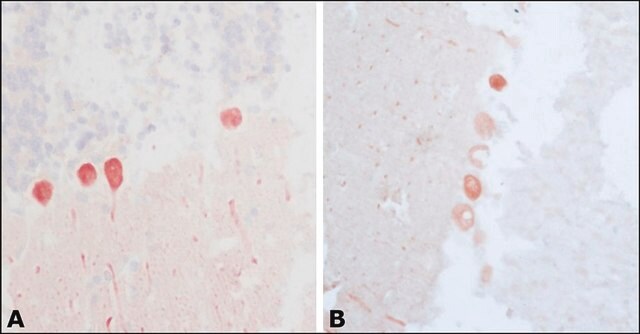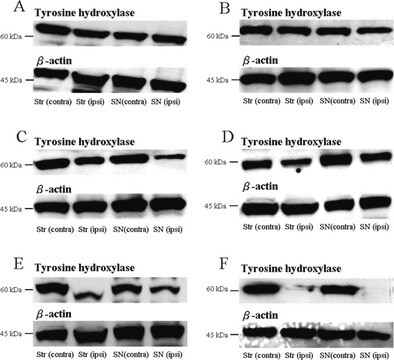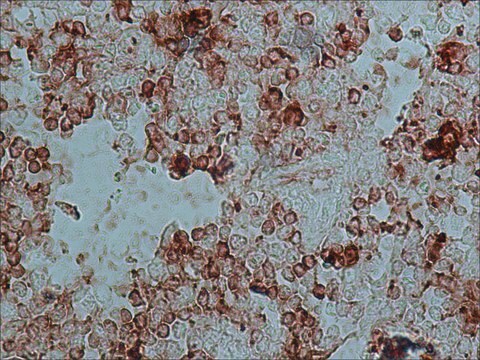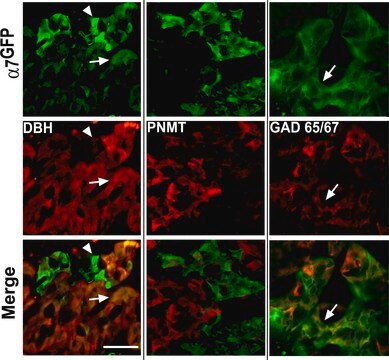AB733
Anti-Tamm-Horsfall Glycoprotein Antibody
serum, Chemicon®
Sign Into View Organizational & Contract Pricing
All Photos(1)
About This Item
UNSPSC Code:
12352203
eCl@ss:
32160702
NACRES:
NA.41
clone:
polyclonal
application:
IHC
WB
immunodiffusion
WB
immunodiffusion
species reactivity:
human
technique(s):
immunodiffusion: suitable
immunohistochemistry: suitable
western blot: suitable
immunohistochemistry: suitable
western blot: suitable
citations:
10
Recommended Products
biological source
sheep
antibody form
serum
antibody product type
primary antibodies
clone
polyclonal
species reactivity
human
manufacturer/tradename
Chemicon®
technique(s)
immunodiffusion: suitable
immunohistochemistry: suitable
western blot: suitable
NCBI accession no.
UniProt accession no.
shipped in
wet ice
target post-translational modification
unmodified
Gene Information
human ... UMOD(7369)
Specificity
One arc by 2D-IEP against Tamm-Horsfall glycoprotein (1 mg/mL). No precipitin line by IEP against normal human plasma. Identity verified by double immunodiffusion.
Immunogen
Highly purified human Tamm-Horsfall glycoprotein (uromucoid) from urine; >95% pure by SDS-PAGE.
Application
IEP: 100 μL antiserum vs. 5 μL uromucoid (50 mg/L)
RID and Rocket RID: 10 μL antiserum/cm2 in gel vs. 5 μL uromucoid (50 mg/L), NT - 1/5
Double diffusion: 10 μL antiserum vs. 3 μL uromucoid (50 mg/L)
*Note: The use of 3% PEG 6000 with 1.2% agarose in a suitable buffer (such as TBE or Tris-barbital pH >8.2) is recommended for the above applications.
Immunohistochemistry
Optimal working dilution must be determined by the end user.
RID and Rocket RID: 10 μL antiserum/cm2 in gel vs. 5 μL uromucoid (50 mg/L), NT - 1/5
Double diffusion: 10 μL antiserum vs. 3 μL uromucoid (50 mg/L)
*Note: The use of 3% PEG 6000 with 1.2% agarose in a suitable buffer (such as TBE or Tris-barbital pH >8.2) is recommended for the above applications.
Immunohistochemistry
Optimal working dilution must be determined by the end user.
Research Category
Inflammation & Immunology
Inflammation & Immunology
Research Sub Category
Immunoglobulins & Immunology
Immunoglobulins & Immunology
This Anti-Tamm-Horsfall Glycoprotein Antibody is validated for use in ID, WB, IH for the detection of Tamm-Horsfall Glycoprotein.
Physical form
In glycine buffered saline, pH 7.4 containing 0.1% sodium azide, 0.1% E-Amino-n-Caproic Acid, 0.01% Benzamidine and 1 mM Ethylenediaminetetraacetic acid as preservatives.
Storage and Stability
Maintain at 2-8°C in undiluted aliquots for up to 12 months.
Legal Information
CHEMICON is a registered trademark of Merck KGaA, Darmstadt, Germany
Disclaimer
Unless otherwise stated in our catalog or other company documentation accompanying the product(s), our products are intended for research use only and are not to be used for any other purpose, which includes but is not limited to, unauthorized commercial uses, in vitro diagnostic uses, ex vivo or in vivo therapeutic uses or any type of consumption or application to humans or animals.
Not finding the right product?
Try our Product Selector Tool.
Storage Class Code
12 - Non Combustible Liquids
WGK
WGK 1
Flash Point(F)
Not applicable
Flash Point(C)
Not applicable
Certificates of Analysis (COA)
Search for Certificates of Analysis (COA) by entering the products Lot/Batch Number. Lot and Batch Numbers can be found on a product’s label following the words ‘Lot’ or ‘Batch’.
Already Own This Product?
Find documentation for the products that you have recently purchased in the Document Library.
Intravenous renal cell transplantation for rats with acute and chronic renal failure.
Kelly, KJ; Zhang, J; Wang, M; Zhang, S; Dominguez, JH
American Journal of Physiology: Renal Physiology null
Jenni Karttunen et al.
International journal of molecular sciences, 22(9) (2021-06-03)
Urinary extracellular vesicles (EVs) and their RNA cargo are a novel source of biomarkers for various diseases. We aimed to identify the optimal method for isolating small (<200 nm) EVs from human urine prior to small RNA analysis. EVs from
Brian M Nolen et al.
PloS one, 8(5), e63368-e63368 (2013-06-01)
The analysis of protein biomarkers in urine is expected to lead to advances in a variety of clinical settings. Several characteristics of urine including a low-protein matrix, ease of testing and a demonstrated proteomic stability offer distinct advantages over current
Obstructive protein cast nephropathy in cynomolgus monkeys treated with small organic molecules.
Guzman, RE; Datta, K; Khan, NK
Veterinary Pathology null
Sung Won Choi et al.
Journal of the American Society of Nephrology : JASN, 16(10), 3006-3014 (2005-09-02)
As a consequence of uromodulin gene mutations, individuals develop precocious hyperuricemia, gout, and progressive renal failure. In vitro studies suggest that pathologic accumulation of uromodulin/Tamm-Horsfall glycoprotein (THP) occurs in the endoplasmic reticulum (ER), but the pathophysiology of renal damage is
Our team of scientists has experience in all areas of research including Life Science, Material Science, Chemical Synthesis, Chromatography, Analytical and many others.
Contact Technical Service







